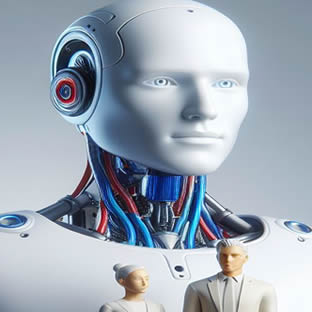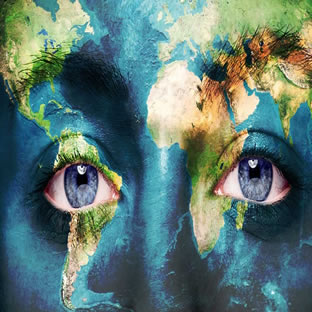Los sistemas de Inteligencia Artificial (IA) se han utilizado de múltiples formas en el ámbito educativo: editores de texto, asistentes inteligentes, algoritmos de búsqueda, traductores, etc. El 30.11.2022, se produjo un salto cualitativo con el lanzamiento de ChatGPT, un programa de IA generativa, capaz de “producir textos sintáctica y semánticamente coherentes”[1]. En sólo dos meses, el programa alcanzó más de 100 millones de usuarios. Rápidamente, salieron al mercado muchas otras aplicaciones que generan textos (Bing, Bard, YouChat, etc.), imágenes (Dall-E, Midjourney, Leonardo, Jasper, etc), audios, videos. El uso creciente de estas aplicaciones en el ámbito educativo ha provocado reacciones entusiastas y también desconcierto. ¿Prohibirlas o ayudar a los alumnos a usarlas de manera crítica y creativa? ¿Cómo identificar el posible plagio y asegurar el rigor científico de los trabajos? El Papa Francisco reconoce que “los sistemas de inteligencia artificial pueden contribuir al proceso de liberación de la ignorancia y facilitar el intercambio de información entre pueblos y generaciones diferentes”. Al mismo tiempo, advierte que estos sistemas “pueden ser instrumentos de ‘contaminación cognitiva’, de alteración de la realidad” (JCS 2024, 7). Se está creando un nuevo ambiente cultural que obliga a las instituciones educativas a discernir sobre “los aspectos sociales y…
The “exciting opportunities and grave risks”[1] that generative Artificial Intelligence (AI) provide, along with its rapid adoption, have alerted the international community. ChatGPT was launched on November 30, 2022, and two months later had already reached 100 million active users, “making it the fastest-growing consumer application in history.”[2] On March 22, 2023, more than 1,000 technology experts, researchers and investors signed an open letter[3] cautioning against the “profound risks to society” posed by giant AI systems. The letter called for a six-month suspension in their development. Notable signatories included high-level specialists like Yoshua Bengio, and entrepreneurs such as Elon Musk, co-foundeder of OpenAI, and Steve Wozniak, co-founder of Apple.[4] The need for ethics Pope Francis’ approach to AI is critical but not pessimistic. He invites us “to set aside catastrophic predictions” and, at the same time, urges the international community to “adopt a binding international treaty that regulates” its development and use.”[5] Besides, he insists that “regulation is, of itself, not sufficient.” Without ethics, we may become “rich in technology and poor in humanity.” Thus, he urges the establishment of “bodies charged with examining the ethical issues arising in this field” (WCD 2024). Fundamental human values must be protected, such…
Artificial intelligence is already part of our lives. It is not a mere instrument, but a living environment. How to inhabit responsibly this new cultural environment in which we are all immersed? How to “live in truth” in the AI era? “Exciting opportunities and serious risks” AI, in its many forms, offers “exciting opportunities and serious risks”[1]. It promises, for instance, “a revolution in processes of accumulating, organizing and confirming data” as well as “important innovations in agriculture, education and culture”[2]. It can also “help to overcome ignorance and facilitate the exchange of information between different peoples and generations” (WCD 2024). At the same time, AI is making it easy for anyone to produce and disseminate content that can be hard to differentiate from real news, thus blurring the distinction between truth and falsehood. In fact, from May to November 2023, “websites hosting AI-created false articles have increased by more than 1,000 percent, according to NewsGuard”. The Washington Post says AI is becoming “the next great misinformation superspreader”[3]. Another article shows that ChatGPT offer different results according to the version used. Curiously, sometimes updated versions do not provide more accurate results[4]. Before the qualitative leap of generative AI, Nicholas Carr…
“This invention will produce forgetfulness in the minds of those who learn to use it, because they will not practice their memory. [… it] will discourage the use of their own memory within them. You have invented an elixir not of memory, but of reminding; and you offer your pupils the appearance of wisdom, not true wisdom, for they will read many things without instruction and will therefore seem to know many things, when they are for the most part ignorant and hard to get along with, since they are not wise, but only appear wise”[1]. Technical dimension vs anthropological dimension These words about writing, attributed to Socrates (469-399 BC) by Plato, are quite similar to those we hear today about artificial intelligence (AI). This shows that, at the anthropological level, the ethical challenges of communication have been essentially the same throughout the centuries, even though the technologies used have changed and continue to evolve. We need to distinguish clearly between the technical and anthropological dimensions of communication. Indeed, “the challenges AI poses are technical, but also anthropological, educational, social and political”. It raises “questions that transcend the realms of technology and engineering and have to do with the deeper…
Spiritual life has been metaphorically depicted through two images: the pilgrimage and the ascent to the mountain’s summit, where the soul will be united with God.[1] Under the influence of “unhealthy dualisms” that have left”a mark on certain Christian thinkers in the course of history” (LS 98), these metaphors have sometimes been misconstrued as an attempt to escape from the despised or unbearable world (fuga mundi). Dionysius the Areopagite used these words to describe the journey toward mystical vision: “Thou, O dear Timothy, by thy persistent commerce with the mystic visions, leave behind both sensible perceptions and intellectual efforts, and all objects of sense and intelligence, and all things not being and being, and be raised aloft unknowingly to the union, as far as attainable, with Him Who is above every essence and knowledge. For by the resistless and absolute ecstasy in all purity, from thyself and all, thou wilt be carried on high, to the superessential ray of the Divine darkness, when thou hast cast away all, and become free from all”[2] We need to develop a spirituality and a mystique that again opens our eyes, enabling us to discover the Invisible in everyday life and experience “the intimate…





